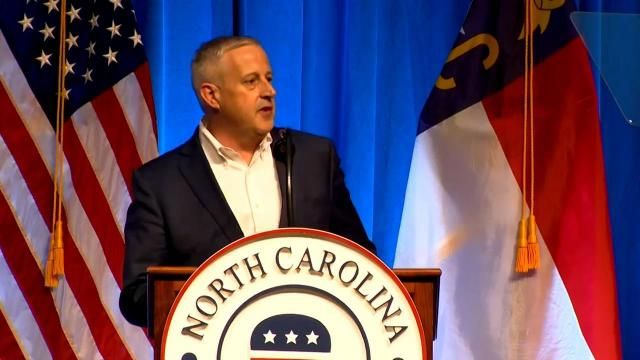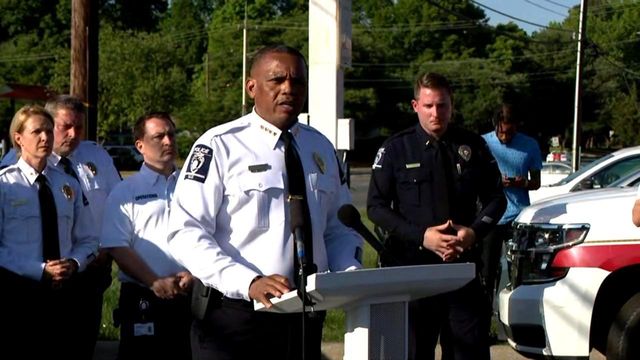How insiders say Trump's pick for RNC chair strengthened the GOP in North Carolina

Former President Donald Trump described the sinking sensation he felt watching swing states such as Pennsylvania and Georgia called for his Democratic opponent, Joe Biden, during the 2020 election.
“All of a sudden, bomb,” Trump said of the Pennsylvania results during a wide-ranging speech in Greensboro on Saturday. “Another one, bombed. Georgia, bombed. North Carolina was like a — it was a beautiful thing.”
North Carolina was the only swing state Trump won in 2020, a fact the former president said guided his decision to back Michael Whatley to run the Republican National Committee.
Whatley, who has been chairman of the North Carolina GOP for the past five years, is considered the front-runner for the national position. Trump has endorsed him for the role, along with daughter-in-law Lara Trump as co-chair. Ronna McDaniel, who was first elected RNC chair in 2017, said Tuesday that she’d step down from the role on March 8. A vote to replace her could come next week.
Trump on Saturday repeatedly blamed his 2020 loss on a rigged election — a claim his campaign and supporters haven’t been able to prove, theories that have also been rejected dozens of times in state and federal courts, including the Republican-led U.S. Supreme Court.
But a crowd of 5,000 Trump supporters cheered loudly Saturday when Trump said the only possible way he can lose again is if there’s cheating.
And that’s where Whatley comes in, Trump said. “We have a man who’s going to watch the cheating," Trump said. "… He happens to come from a place called North Carolina. You know who I’m talking about. He’s going to be the head of the Republican Party, and he’s going to be great.”
Trump said that if elected president he’d push for a national ban on early voting and mail-in voting — despite voting by mail himself — and make it so that there would only be one day people would be allowed to cast their ballots.
If party members vote Whatley into the RNC position, he would leave North Carolina politics the same way local Republicans remember him re-entering it in 2015: alongside Trump. Back then, he was an adviser for Trump and their relationship has strengthened over the years as Whatley helped Republicans win in North Carolina and ascended the ranks of the RNC, becoming the national organization’s general counsel last year.
Whatley returned Trump’s praises Saturday, saying in a brief speech that “when we had Donald Trump in the White House, the world was a safer place.”
North Carolina Republicans who’ve known him for years say Whatley earned Trump’s trust by supporting his presidential ambitions from the start, organizing rallies and guiding the campaign through the state in 2016 — then delivering North Carolina to Trump in 2020 when other swing states turned blue.
“Once you get to know him and you watch how he leads and his approach to things, it’s easy to understand why every organization he’s involved in promotes him as high as they can as quickly as they can,” said state Sen. Brad Overcash, R-Gaston County, who met Whatley in Gaston County at a local GOP event and remains friends with him.
Party operative
Whatley, who declined to comment for this article, began his professional career in politics as a legal advisor for the George W. Bush campaign, helping with the 2000 recount in Florida. He transitioned to the U.S. Department of Energy under Bush and then worked as chief of staff for former Sen. Elizabeth Dole, a North Carolina Republican, before going into the energy sector.
When Whatley returned to North Carolina in 2015, his support for Trump made an impression on local Republicans.
“I’ll never forget running into him on Fayetteville Street” in downtown Raleigh, said Jonathan Felts, a Republican campaign strategist. It was 2015 and the party’s presidential primary was still wide open.
“He was one of the first people who told me he sincerely thought Trump was going to win,” Felts said.
Whatley served as an advisor to the Trump campaign while continuing to work primarily as an energy consultant until 2019. That’s when a group of North Carolina Republicans approached Whatley about running for state party chair.
The state party needed stability.
In February 2019, the state elections board ordered a new election in North Carolina’s 9th Congressional District after learning that the Republican candidate benefited from a ballot harvesting scandal. That April, then-Chairman Robin Hayes was indicted on federal charges for lying to the FBI as part of an investigation into a bribery scheme. Then two weeks later, Executive Director Dallas Woodhouse announced that he planned on leaving the position.
Jim Womack, a longtime conservative activist and elected official from Lee County, sought to become the state GOP chairman and cast himself as a grassroots favorite. But GOP insiders say some party members were uneasy about Womack because he defended former party chairman Hasan Harnett, who the party ousted for allegedly violating party rules.
So a group of Republicans recruited Whatley to run.
“We really wanted to professionalize the party. We really wanted someone who had experience at all levels,” Overcash said. They knew Whatley, with his network in Washington, D.C., and ability to raise money, “could hit the ground running.”
Whatley won while calling Trump’s 2020 reelection bid “the most important election cycle in our lifetime.”
Under Whatley’s leadership, the state party set records for fundraising and voter outreach on its way to winning marquee races.
NC ‘boot camps’
Whatley’s record has come under scrutiny since Trump endorsed his bid to lead the RNC.
The Democratic National Committee said Whatley shouldn’t be considered for RNC chair because he hasn’t publicly denounced a 2024 Republican legislative candidate with purported ties to white nationalist groups. “Refusing to condemn a white supremacist with neo-Nazi ties should be disqualifying,” said Alex Floyd, a DNC spokesperson.
The candidate, Joseph Gibson of Rockingham County, denies supporting the groups. Republican operatives tried to remove Gibson from the ballot before the primary, arguing that a past felony conviction disqualified him. A Democratic-leaning county board voted to allow Gibson to stay on the ballot when it found that he was indeed qualified to run.
Republican Party rules prohibit party officers from influencing primary elections. Asked about Whatley’s silence, state GOP spokesman Matt Mercer cited those bylaws.
The state party and Hayes, its former chairman, previously disavowed a Republican legislative candidate who faced allegations of racism. The party withdrew its support after the candidate won the primary.
Whatley’s efforts on election integrity — the focus of Trump’s praise Saturday — have also come under the microscope. Whatley recruited thousands of volunteers and hundreds of attorneys to be part of the state’s election integrity team. He faced criticism for claiming that Democrats were engaged in a massive voter fraud in some large U.S. cities, an unproven claim that has been dismissed by Trump’s former attorney general, William Barr.
Anderson Clayton, chairwoman of North Carolina’s Democratic Party, described Whatley as “a proud and unapologetic election denier” in a recent opinion article on MSNBC’s website.
John Steward, the party’s 8th Congressional District chairman, says Whatley is excellent at preparing for elections. He holds “boot camps” for county leaders to teach them about everything from recruiting door knockers to training election observers, Steward said.
“That's one of his lasting legacies, the fact that he's supported the county parties so readily,” Steward said. “Anything they ask he tries to help them with.”
Not every Republican on the ground feels the same way. A grassroots candidate, John Kane Jr., challenged Whatley for chair last summer. Whatley’s critics then sued the state party after Kane lost the election, alleging that Whatley benefitted from irregularities on the party’s mobile voting app. A judge dismissed the lawsuit.
“I can only conclude two possibilities. One, he felt he needed to cheat to win. Two, he is completely incompetent. Both are disqualifying,” Kane told the Associated Press.
The party has acknowledged that the app had issues, while saying they didn’t affect the outcome of the vote. Given Whatley’s relationship with Trump and the time he’s invested in county leaders, Steward says he doesn’t understand the chairman’s Republican detractors.
“I've been the district chairman for 12 years. I've worked with five different state chairmen. He is by far the best chairman I've worked with,” Steward said.
Judicial legacy
Republicans have been largely dominant in North Carolina races under Whatley’s leadership since 2020, with the exception of Democratic Gov. Roy Cooper and Attorney General Josh Stein’s wins that year. That year, Trump won the state, Republican U.S. Sen. Thom Tillis won reelection and Republicans won three state Supreme Court races — completing the first step in Whatley’s plan for the GOP to eventually retake control of the state Supreme Court.
Republicans lost their majority on the court in 2016. To provide more financial support for judicial candidates, Whatley created the “judicial victory fund” — a new type of campaign account for the party.
“What we were doing for the judicial races could only be done through the state party,” said Paul Shumaker, a longtime Republican strategist. “It can’t be done through independent expenditure operations because of coordination rules.”
It worked. Republicans won every statewide judicial race in 2020 and 2022, taking control of the state Supreme Court.
“That’s how we got our majority on the court,” Shumaker said of Whatley’s plan. “Because of him.”
Also in 2022, then-U.S. Rep. Ted Budd won North Carolina’s open U.S. Senate seat and Republicans came within one seat of earning a supermajority in the N.C. General Assembly. Republicans ultimately secured that supermajority — and the ability to override Cooper’s vetoes — when state Rep. Tricia Cotham switched from the Democratic Party to the GOP in April 2023.
Legislators have since enacted new tax cuts, allowed families at any income level to access private school vouchers, and rolled back abortion rights. Meanwhile the state Supreme Court delivered wins to Republican lawmakers on voter identification rules, felon voting rights and gerrymandering — in some cases overturning past precedent to do so.
The court last year overturned a previous ruling that led to a 7-7 split in North Carolina’s congressional delegation. The GOP-controlled legislature redrew the map to give Republicans an advantage in 10 districts and Democrats an advantage in three, with only one toss-up.
Former party chair Tom Fetzer is known for ushering-in the “Republican revolution” of the early 2010s — helping the GOP take control of the legislature for the first time in a century. Whatley, GOP insiders said, should be known for helping Republicans secure the judicial branch.
The GOP is guaranteed to keep control of the state Supreme Court until at least 2028. That’s the earliest Democrats could retake the majority — and only if they win a seat back this year. If Democrats lose this year’s race, the earliest they can then gain a majority is 2030.













